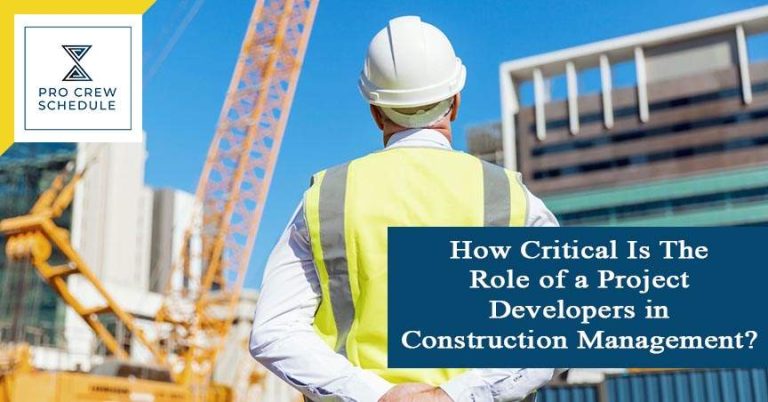In managing construction, it’s not only the project owner and the general contractor who are heavily involved. Between these two key people, a certain individual mediates both parties- the Project Developer.
A Project Developer (aka the PDs) has many responsibilities and roles and works with the whole construction team to bring the idea from planning to completing the project. This important role requires above-average communication skills, in-depth knowledge of construction, and familiarity with most corporate finance concepts. The project developers are assigned to complete the project on schedule and budget.
Who is the Project Developers in Construction?
A Project Developer in the construction industry is a professional who oversees the operations of a project through feasibility research and the creation of plans that would best suit the project’s needs. These professionals usually work side-by-side with Project Managers (aka PMs) to develop construction management activities, schedules, and regular project tracking for progress reports. They can also handle the overall budgeting to secure funds for the project and undergo a cost-benefit analysis to enhance the business decision processes.
Project Developers vs. Project Manager: What are the Similarities?
Both the Project Developers and Project Managers are considered ‘leaders’ in the construction field who work with highly skilled employees to ensure successful project completion while staying on budget. Some of the similarities between Project Managers and Project Developers are the following:
a. Educational Capabilities
Choosing any of the two professionals would generally require a bachelor’s or higher degree in construction management, business development, or administration. Academic qualification can give a candidate better chances for advancement into both occupations after getting a few years of working experience with project development teams, and acquiring an internship while in school is also a possible option for either occupation so you can have an opportunity to apply your academic learnings in a practical setting.
b. Job Opportunities
Both professions are leadership-focused, with room to progress. Project Managers and Project Developers have greater access to other high-ranking roles that manage construction projects. From either of these positions, you can move into senior roles as a project leader, such as a senior project manager, business development director, or senior managing consultant.
c. Work Environment
Both Project Developers and Project Managers generally work inside an office, quite differently from other professionals in the construction industry. However, the details of your work will primarily depend on the project they are handling. For instance, for ongoing construction projects, these professionals will spend most of their time inside their cubicles in the office and deal with construction scheduling, task delegation, and multiple meetings with various teams to ensure that everyone is on the same page regarding activities and timelines.
Most of them work full time during normal working hours, but many may need to work overtime to meet project deadlines. However, a Project Manager schedule may also include travel from time to time to do site visits and check project progress to be presented to the higher management.
What Do Project Developers Do?
1. Project Feasibility Studies
One of the primary responsibilities of a project developer is to assess the feasibility of a proposed construction project. Feasibility studies look at all critical aspects of construction viability, such as site acquisition, planning and design, financial runs, and establishing a professional team to handle the design and construction. Ultimately, a Project Developer’s role was the get an architect for small projects. Still, for larger projects, developers are expected to take a managerial role and appoint work to professionals who can undertake their specialized roles within a project.
2. Financial Runs (throughout Project Lifecycle)
Project Developers are usually the main financiers of construction projects or the key person handling all the money involved in project management. Many Project Developers will have served apprenticeships in various trades to have a clear understanding of design and construction-related concepts. Some Project Developers will even hire in-house accountants who are more specialized in the financial aspects of managing construction projects and, more importantly, how to account for them. A satisfactory project is often time-dependent since many buildings are built relative to economic trends that may quickly change.
4. Project Site Development
The Project Developer is also heavily involved in site selection and acquisition as they consider many factors that may affect the project’s development. These factors may include zoning, access to affordable labor and cost of utilities, and environmental implications and sustainability. The project site may also be selected depending on the state and local tax structures, the size of the surrounding community, and environmental conditions. The Project Developer may look for project sites within the geographic location requested by the client and may also look into the proximity to public and air transportation.
5. Creating Highly-Skilled Teams
A Project Developer must select a PD team, including general contractors, subcontractors, architects, finance experts, lawyers, interior designers, and other support staff. As the Project Developer, they will assign tasks in project management and conduct meetings to ensure that the project deadlines are met and fulfilled.
6. Overseeing Construction
The Project Developer will be the one to put out requests for proposals (RFP). Once the general contractors or sub-contractors are chosen, the Project Developer makes sure that construction is completed within budget. This project development phase usually requires over-the-top problem-solving skills to avoid costly delays or budget overruns.
6. Marketing and Property Management
While it is not always the case, the Project Developer may also be required to oversee the project for a certain period of time to market to the public and manage the property. Once the end stage of the construction process is reached, the Project Developer is well versed in the advantages and disadvantages of a construction property and, therefore, can be very knowledgeable in marketing and managing the property.
Tips for Career Advancement as a Project Developer in Construction Industry
1. Acquire Good Working Experience
One way to progress in your career as a PD is to gain more working experience in the construction industry. You can take on more tasks at work or pursue opportunities outside your company to work on new projects. For instance, you might work freelance, contractually, or part-time with other companies as long as your current company is informed about it. You might also reach out to colleagues in construction and volunteer your services if you have free time to expand your network and knowledge.
2. Get Additional Certifications
Regardless if you’re a Project Developer or even a Project Manager, there’s an array of licenses and certifications that you can earn to leverage your credibility and widen your career advancement opportunities. The key benefit of earning more certifications is expanding your knowledge and discovering new ways to optimize your project management and development leadership skills. It can also help to show your interest and drive to keep learning about your job and the industry.
3. Apply for Higher Positions in Your Company
If you want to progress to a higher position in your company, you may consider the roles of a Senior Project Manager, Project Director, and Business Development Manager. However, your chances of moving into even higher leadership roles may depend on your company’s hierarchy and corporate structuring. You could reach out to your supervisor or another executive team member to express your interest in a bigger position. Use your expertise and past accomplishments to illustrate why a more senior role is more beneficial to the overall project productivity.
4. Apply to More Competitive Companies
When you’re ready to take your career to the next level, consider looking for a similar or higher role at a new company. Competitive companies or those with bigger budgets and projects may introduce new roles that more closely align with your long-term career goals. To broaden your options, search for jobs based on specific keywords rather than the typical job titles. This can help you get opportunities you still qualify for but weren’t evident earlier in your job search.
5. Incorporate a Construction Management Software into Your Process
Construction project management is considered one fluid process. A Project Developer’s everyday roles and responsibilities can vary on a given day, but almost all of them will deal with managing construction.
Incorporating project management tools such as Pro Crew Schedule can help you streamline your day-to-day activities. The ability to change daily schedules adjust plans, and delegate tasks quickly means you’ll have a finger on the pulse of your project. Spend more time on decision-making tasks and leave the others for the construction management software to deal with.
Being a Project Developer is one of the most challenging positions in the construction industry, but also definitely one of the most fulfilling ones. Furthermore, you don’t have to be alone in this endeavor. Start your 30-day free trial with Pro Crew Schedule today.







